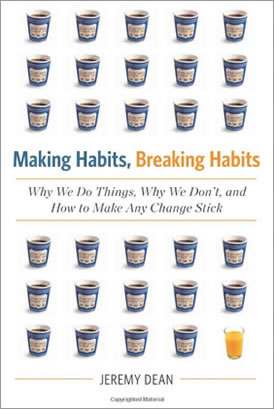About 50% of our everyday lives are habitual. While we’re awake, then, about half the time we are repeating the same actions or thoughts in the same contexts. Automatically. Without thinking. It’s part of the reason change is so hard.
It’s clear from this that how habits form, operate and change is a vital component of how we experience life.
The vast majority of our established habits are good, like looking both ways before crossing the road or brushing our teeth. But what if you want to ingrain a new habit like learning an instrument, eating more vegetables or cycling to work:
- How long will it take?
- Will it get crushed by your existing routines?
- Who will win in the battle between intentions and established habit?
What Amazon.com readers are saying…
“This is a real gem of a book that is filled with valuable insights into why we do the things we do and why it’s incredibly hard to change our ingrained habits.” —Jarie Bolander
“Dean draws exciting insights on habit formation from published research in human behavior and writes with the simple clarity of a self-help book.” —David Thomas
“It has helped me with true introspection and making active changes to lifelong bad habits.” —A. Marks
“I feel MUCH more confident that my students and my clients will find success in creating a healthier life from the information I have gained from reading this book.” —PermaCoach
“…does a great job of walking the reader through the issues of what habits are, why we have them, why they are hard to break…” —Dr Manejwala
Based on psychological research
‘Making Habits, Breaking Habits‘ distils the results of hundreds of studies containing thousands of participants, to give you a blueprint for how to create a new habit and tackle bad ones, whatever they are, and how to make it automatic so that willpower is no longer an issue.
The book explores the research on habits most of us have tried to ingrain like healthy eating and exercise.
You will learn:
- Why the performance of habits is curiously emotionless.
- Why we lose the pleasure from our good habits and how to regain it.
- How to develop more creative habits.
- How and why habits are cued up automatically by our environments.
- Can you really be addicted to Facebook, Twitter or email?
- Why habits of thought are at the root of depression and other mental problems.
They psychology of habits is explained in a straightforward, witty way with no technical jargon.
Get the first chapter for free…
→ Click here to read the first chapter for FREE (PDF format).
→ Kindle owners: If you would like the first chapter delivered to your Kindle device then visit Amazon.com and click ‘send sample now’. It will be sent to you for free.
Overview
In the first part of this book, The Anatomy of Habit, we look at how good and bad habits are formed. The first four chapters examine where habits come from, how they feel to perform, how much of life they take up as well as the roots of our ambivalence towards them. This section answer the question of why we can find ourselves powerless to control our habits.
In part two, Everyday Habits, we zoom out to look at the performance of habits in everyday life. With our new understanding of how habits operate we look at how this plays out. It reveals how understanding our habits illuminates both our social lives and our inner lives. Habits aren’t just repetitive actions; they can also be repetitive thoughts. When repetitive negative thoughts get out of hand, we have the basis for depression and other psychological problems. This section also looks at how habits operate when we eat, work, socialize, shop, fly, get medical treatment and go online.
Part three, Habit Change, looks at what the psychological research can tell us about how to make new habits and how to break bad old habits. The conclusions are cautious because habit change is difficult, but the science does point to some effective techniques that can help us reach our goals for personal change, with a particular focus on healthy habits like eating and exercise. Then the discussion is broadened out to look first at creativity then happiness. It explores what the science of habit tells us about how to make ourselves happier and more creative.
What reviewers are saying…
“Sensible and very readable…By far the most useful of this month’s New You offerings.”
“For you if you want 2013 to be the year you keep your resolutions.”
Publishers Weekly, 12/10/12
“An accessible and informative guide for readers to take control of their lives.”
About the author

Dr Jeremy Dean is a British psychologist and author.
He has a PhD in psychology from University College London.
He is the owner and author of the popular website ‘PsyBlog’, which describes scientific research into how the mind works.
His most recent ebook was “Spark: 17 Steps That Will Boost Your Motivation For Anything”.
Formats
The book is available as a hardback in the US, a paperback in the UK.

It’s also available in ebook format for the Kindle, Nook, iPad etc..
Table of contents
Part One: Anatomy of a Habit
1. Birth of a habit
2. Habit versus intention: an unfair fight
3. Your secret autopilot
4. Don’t think, just do
Part Two: Everyday Habits
5. The daily grind
6. Stuck in a depressing loop
7. When bad habits kill
8. Online all the time
Part Three: Habit Change
9. Making habits
10. Breaking habits
11. Healthy habits
12. Creative habits
13. Happy habits
Get the book now
It’s available now on Amazon.com and at all good retailers.
